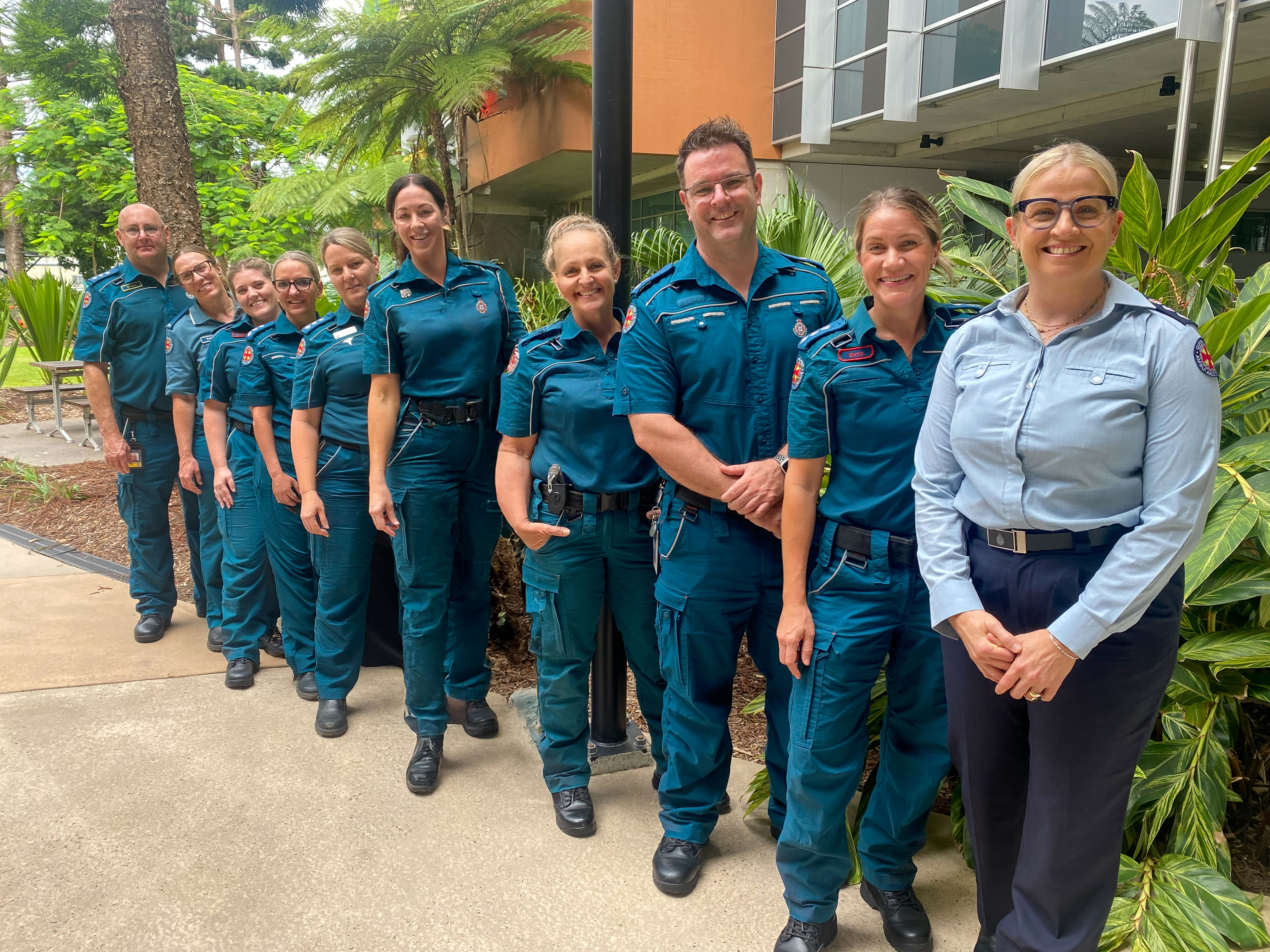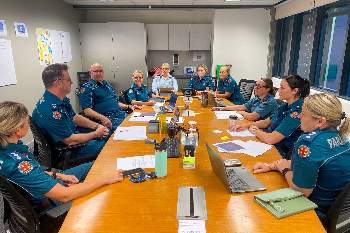
A statewide team has been developed within Queensland Ambulance Service’s (QAS) ranks to work closely with people in our communities who frequently call ambulance services and often have complex healthcare needs.
The Complex Care Team (CCT) was officially launched this month, and its Executive Manager Scott Nash said its aim was to provide a compassionate and comprehensive approach to supporting Queensland’s most vulnerable people.
“The Complex Care Team began as a Complex and Frequent Presenter Program (CFPP) pilot in August 2023 after we identified a small group of particularly vulnerable people across the state who made a disproportionately high number of Triple Zero (000) calls for service,” Scott said.
“Our goal was to improve our understanding of these patients’ needs, so we could connect them with appropriate care and support services.”
The CCT works within the Office of the Medical Director and most of the team members are based in their local regions as their local knowledge is integral to the team’s success.
Scott said the CCT forms part of the non-traditional response, or non-BAU group Mental Health Response Program Director Sandra Garner has developed over the last few years.
“We collaborate with staff and on-road teams across our service but certainly work very closely with our more non-BAU response colleagues like the Specialist Clinicians in the Operation Centre’s Mental Health Liaison Service and the Clinical Hub’s specialists like the Social Workers, harnessing their knowledge and skills to better support our patients,” he said.
Scott emphasised despite this group’s higher demand for QAS services, the QAS never discourages people from calling Triple Zero (000).
“Our team works with a diverse group of people, and while older people tend to be higher users of healthcare services, we were surprised to discover women aged in their 20s to 30s in fact made up a higher proportion of people identified in the program.
Sandra said one thing each person shares is that they experience high levels of vulnerability.
“It’s important to remember these people may have layer on layer of health and social issues, and as a result, they might lack the resources and resilience to manage life’s daily challenges,” Sandra said.
“These challenges may not seem significant and might barely register to other healthier and more resilient people in our communities.
“But often, these highly vulnerable community members will call us because they feel completely overwhelmed.”
Scott said the reasons for their calls could be singular or combined and could include chronic pain, social isolation, mental health issues, inability to access other healthcare services, loneliness and feeling unsafe.
He said the CCT has recently developed a central referral system that guides QAS clinicians to refer people who may have the following concerns and may need additional services or supports:
- Frequent ambulance use
- Complex care needs
- Complex medical history
- Multi-agency involvement
- High use of QAS-administered pain relief.
“In our early stages we took a proactive approach, identifying people with complex care needs through their patterns of ambulance use,” Scott said.
“Now we’re engaging more at a staff and external stakeholder level, like hospitals and nurse navigators, general practitioners and other health care providers, encouraging them to refer patients they might identify within this cohort to our teams,” Scott said.
“Our multidisciplinary approach extends beyond our QAS and Queensland Health and Hospital Service staff, but also to the patients’ care providers to ensure their plans are comprehensive and fully integrated.
“When we receive a referral, our team will conduct a deep dive into the person’s case history so we can understand the underlying reasons for their frequent Triple Zero (000) calls.
“Our team is there to advocate for our patients, to ensure they receive the care to match their complex medical, social or mental health needs.
“We will understand each person’s care needs and can link them in with appropriate health services when needed, and may develop an individualised patient management plan, or Ambulance Information Document (AID), to guide our QAS responders.”
Scott said these AIDs will serve as a critical tool to support QAS clinicians, so they can provide appropriate, compassionate and trauma informed care to people with complex health needs.
“AIDs have been carefully developed to guide our QAS Clinicians, they’re brief – usually 1-2 pages only – and are easy to follow as they’re written by paramedics for QAS Clinicians to be an easy-to-follow plan placing the patient at the centre of the care being provided,” Scott said.
“AIDs are tailored to the individual, based on information the CCT gathers and will include important details and guidance about their health history and their previous interactions with QAS.
“They suggest helpful or proven strategies for care to support clinical decision making.
“The Medical Director’s Office endorses each AID, so they’re an added layer of support to QAS Clinicians, based on input from a multi-disciplinary team.
“Consistently applying these plans’ principles and guidance affords the clinicians the greatest chance of seeing a positive result in the provision of care.”
Scott said AIDs should be read in conjunction with the Clinical Practice Guidelines (CPGs), clinicians will be alerted to them in a medical caution note and are available on the VIEWER.

Scott harnesses patient journey passion
After 16 years with QAS, Complex Care Team Executive Manager Scott Nash said he was excited about taking on this newly created role.
I began with QAS working on road, and then at QAS Education Centre (QASEC) before moving to Kedron to work with the Medical Director’s Office on innovative models of care projects.
“I’ve always been passionate about my peers and the development of the profession of paramedicine,” he said.
“Working within QASEC provided me great insight into how we can best share and advocate for the journey of vulnerable people.
“The education programs I developed always focused on our patient’s journey and how we can best support them through a period of vulnerability,” Scott said.
“While working on road, I had one particular patient who had been unable to advocate for themself, but, as a direct result of being more informed about their needs, we were able to ensure they had a far more positive experience, and it was this which sparked a special interest in working with our more vulnerable, complex and frequent patients.”
“The development of this program coupled with the support our new CCT provides, has the potential to improve the way we inform clinicians of how vulnerability presents in acute and complex ways and how nuanced care can be provided.
“The more we can do to improve the way we manage and achieve nuanced care for these people across the hospital and out of hospital environment the better the outcome for them.
“And hopefully we’ll soon see these carefully tailored strategies making small but positive steps to support our service along with the broader health system.”
You can access the referral form here or via the Portal.
More information is available on the dedicated Complex Care Team Portal page.